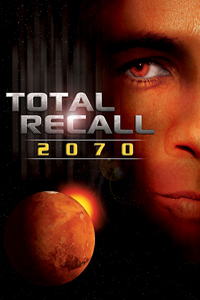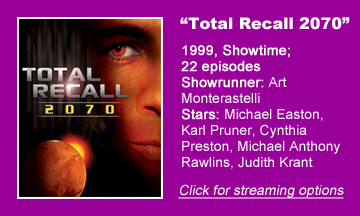“Total Recall 2070” (1999, Showtime) is two degrees removed from Philip K. Dick — a 22-episode reimagining of the 1990 movie adapted from Dick’s short story “We Can Remember It for You Wholesale.” But actually, while it’s further from the story of “Wholesale” than the film is, it takes a step closer to an overall Dickian feel.
Future-tech procedural
The series sits at the aesthetic crossroads of “Blade Runner” and “Total Recall,” albeit on a tighter budget than those blockbuster films, and at the narrative intersection of “The X-Files” and “Star Trek.” It’s not unfair to call it just another one-season wonder from the ’90s SF boom, but PKD fans might find it to be a fascinating curiosity.
This future-tech procedural started off slow for me, but I really got into it by the end and would’ve happily followed it into more seasons. The main cast consists of B-list answers to A-list stars.
Michael Easton channels Keanu Reeves as police detective David Hume, who is partnered with Karl Pruner’s Ian Farve, an android who is a buff answer to “Star Trek’s” Data.
As the station’s medical and tech expert Olan, Judith Krant has a smoothness that calls to mind Morena Baccarin, and Michael Anthony Rawlins plays Lt. Martin Ehrenthal in the gruff, measured fashion of “The X-Files’ ” Skinner.
“2070’s” central thread is the uncomfortable rise of androids in Los Angeles and society at large. Here, it leans more toward “Blade Runner” than “Do Androids Dream of Electric Sheep?”
Rise of the machines
Famously, the film emphasizes the sympathetic and victimized aspects of androids, contradicting Dick’s position that androids are unavoidably ersatz humans – if they seem real, that’s because the illusion is so frighteningly good.
“2070” shows plenty of evil done by androids – starting with the murder of David’s previous partner in the pilot – but it generally blames those deeds on “programming.” Meanwhile, Farve continually proves his humanity and wins David over.
I love the way the mythology is set up in a bizarre fashion that Dick might’ve appreciated: Farve is assigned to the police precinct as David’s partner, but because the bureaucracy is so convoluted, no one knows exactly who signed off on it.
It turns out no human being did: This is all engineered by the mysterious “Maker,” whom Farve is searching for – showing a very human spiritual side.
It builds to a strong finale that imagines mutual fear between two sides – like what leads to “Terminator’s” Skynet — might be muted if cooler heads prevail. If humans and androids work together, both can progress into the future in cooperation and friendship.
Digging into characters
A viewer who bailed after the pilot episode will be surprised to learn that “2070” increasingly digs into its characters. David is a more competent and grounded protagonist than you’d find in most PKD yarns, but his marriage travails line up well with PKD – albeit with less meanness from the spouses.

In addition to the trope of the cop too often choosing work over his wife, David’s marriage takes a blow when Olivia (Cynthia Preston) is found to have a chip in her head. She has lived two lives; her life as “Carol” has been erased, and her seven years with David are made possible by the chip.
So what’s real to her is in a way artificial, and her actual real life is gone from her memories. Understandably, that’s a mind-trip for both her and David.
None of the teleplays draw directly from Dick works, but one comes close: “Virtual Justice” (episode 21) is about a corrupt cop who falsifies witnesses’ memory statements in order to pin suspects. (These statements are virtual-reality recordings that can be viewed in a Sublimator, a home and office version of Rekall’s memory implant chair.)
Ehrenthal notes that the whole justice system is based on the reliability of these recordings, similar to Pre-Crime in “Minority Report.”
Leaning toward ‘Blade Runner’
This episode also name-drops “Roy Beatty” and “Kent Deckard,” so there’s little doubt “2070” knows its Dickian background. Creator Art Monterastelli acknowledges the series draws as much from “Blade Runner’s” humanity questions as it does from “Total Recall’s” memory questions.
In terms of look and feel, it likewise leans more toward “Blade Runner.” It’s always evening or nighttime, and it’s either sweltering or raining. At one point, David suggests moving to “the territories” (presumably the moon and Mars) so they can see “the real sun.”
The L.A. cityscape is mostly computer generated, and establishing shots of people moving along the walkways are recycled far too much, but the “BR” aesthetic is there if you can forgive the cheapness. The multi-level city is crowded, and it features nooks and crannies that derive from construction atop previous construction.
The living and working spaces are comfortable reprieves. The apartment of David and Olivia has an Asian feel, with thin semi-transparent doors. It has blinds and shafts of light, which pair well with the noir piano score that tends to kick in when David broods.
At other times, the composers use synthesizers, horns or classical strings; the aural variety makes up for the repetitive establishing shots.
Present and future tech
The tech is a Dickian mix of present and future. The cops sometimes use cellphones, but they rely on their non-mobile vidphones and recorded messages more than is likely for 2070. A “cathode-ray recycling center” pops up at one point, calling to mind those window displays of 1982 TVs in “Blade Runner’s” 2019.
The big issues from the fictional period of 1999-2070 include “the calamities of 2020,” a climate event that wiped out several species. “Nuclear proliferation” also stopped “50 years ago,” so perhaps nukes and the climate event are linked.
Stem-cell research is still controversial in 2070, as we learn via the intriguing notion that the basis for the androids’ brains comes from living human brain tissue. Job protectionism is explored when a law (which comes about from union pressure) forces a factory to use humans even though androids are more efficient.
In “2070’s” future, the all-seeing state is normalized; it’s impressive that the writers of a pre-9/11 show saw this coming. “Baby Lottery” (9) strikingly illustrates that humans are tied to the state starting even before the cradle. Universal health care is available to the offspring if the parents allow genetic screening and corrections.
If they don’t, the genetically flawed youth becomes a ward of the state, which attempts reconditioning. People technically have a choice to submit to the state, but functionally they do not, as this episode’s parents learn when they challenge the accepted norm.
Notable guest turns
Despite the fact that “2070” is the most notable role for most of the main cast (Easton is an exception, as he’s a big star in daytime soap circles), the show features a few notable guest turns:
- In “Nothing Like the Real Thing” (6), Laura Harris – previously of “The Faculty,” later of “Dead Like Me” – plays a teenage virtual sex worker. She fits the bill of one of those alluring teenage girls that PKD’s middle-aged protagonists can’t resist.
- Veteran character actor David Warner (“TMNT II: The Secret of the Ooze”) appears in “Brain Fever” (10) and “Begotten Not Made” (11) as a doctor blackmailed into implanting brain-control chips into unwitting human subjects.
- In “Assessment” (18), Steven Williams – X from “The X-Files” – plays the leader of activists worried about the rise of androids at the expense of humans. Appropriately, this is like one of those “X-Files” mythology episodes where we see previous events with the spin of a new perspective.
- Titus Welliver (“Bosch”) guests in “Personal Effects” (20), a romantic showcase for Olan, who finally gets free of her lab.
- The most surprising guest star is Martin Sheen, who plays an anti-android activist in “Virtual Justice.” “The West Wing” would debut later in 1999.
Influenced by ‘X-Files,’ too
“2070’s” teleplays generally hold up, as do most of the performances; the budgetary constraints bring the stories down, but not to the breaking point.
There’s some sex and swearing if you watch the original Showtime airings, but all of it is gratuitous and can be overlooked.
The series’ status as a piece of Dickiana is tenuous. It doesn’t expand the “Total Recall” story, as the film takes place in 2084 on a different timeline.
Indeed, its strongest influence is not PKD, but rather “The X-Files” – as seen in the bureaucratic obfuscation, complex conspiracies, general mistrust and the writers’ willingness to leave details unexplained; granted, those things indirectly line up with PKD, too.
But “Total Recall 2070” has a certain stylistic and intellectual charm, and PKD completists might be pleasantly surprised by the engaging stories and the occasional element that would’ve made the author proud.


